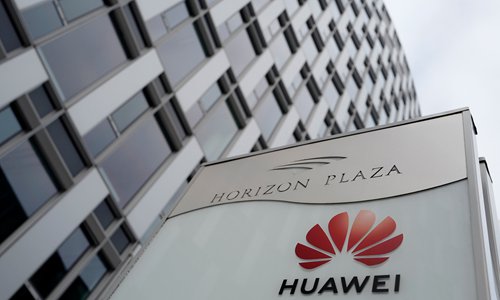HOME >> BUSINESS
US desperately building allies against Huawei: analysts
By Yang Kunyi and Chen Qingqing Source:Global Times Published: 2019/9/3 23:08:40

File photo: VCG
Huawei is confident in thriving in Europe - its major market outside China - in spite of US pressure, as the latest attempt of Washington in excluding the Chinese company from the 5G roll-out in Poland would end in vain, as the consensus has been formed in the telecom industry that the risks of Huawei are not perceived, industry insiders said.
In the latest attempt to exclude Huawei from the rising global 5G network, US Vice President Mike Pence on Monday signed an agreement with Polish President Andrzej Duda that - without singling out Huawei - will mean tighter guidelines in Poland and tougher evaluation of 5G network providers for signs of foreign control.
China's Foreign Ministry spokesperson Geng Shuang said on Tuesday that China opposes politicizing 5G or taking discriminatory actions in 5G cooperation. A spokesperson at the Chinese Embassy in Poland also responded on Tuesday that China trusts Poland to fulfill its promise of keeping the telecommunications market free of discrimination against any countries or companies.
The US and Poland signed an agreement to cooperate on 5G technology with the clear aim of countering Huawei's growing presence in Poland and other European countries, but politicizing technology and leveraging political as well as diplomatic influence to lobby other governments to ban Huawei equipment would only end up being ignored by European countries, industry insiders said. "Huawei has been maintaining a good network security record in the Polish market, working actively in helping fulfill the country's digitalization plan. The Polish government will make the right choice that brings benefits to local people," a source close to the matter said, referring to the Chinese company's strong confidence in the market in spite of the US crackdown.
The European market is Huawei's second largest, and Poland has been a strong foothold for Huawei's deployment of 5G in Europe. On Tuesday, Huawei confirmed that it has delivered more than 200,000 5G base stations globally and has secured more than 50 commercial 5G contracts. According to media reports, about 60 percent of the contracts are in European countries.
In sharp contrast to government indecision, local operators in Europe have continued their partnerships with Huawei. In August, the UK mobile operator Three rolled out its 5G service with routers provided by Huawei. Other UK operators, including EE and Vodafone, are also selling Huawei hardware such as the Huawei Mate 20 X 5G to their customers, although the UK government has yet to make a decision, partly under pressure from the US. Two major 5G trials in Poland, run by Orange and T-Mobile, also involve cooperation with Huawei.
Huawei's cooperation with Europe also runs deeper than building and deploying 5G base stations. As the leader in the emerging 5G technology sector, Huawei is also a key contributor in 5G standards and operating rules.
Losing cost advantage
According to IPlytics, a patent research company, Huawei is the biggest holder of 5G standard essential patents, which are compulsory patents that companies need when using standardized 5G technology.
The prominence and technological advance of Huawei in 5G means that blocking the company will translate into losing a cost advantage and lagging behind in the 5G race. That has led to some local analysts raising doubts as to what political benefits Poland can get out of its agreement with the US.
This also partly explains why more European countries have ignored US pressure by continuing to work with Huawei on 5G roll-outs, he noted.
As the signed declaration is actually part of the US-China trade war, and as Washington has turned the global 5G roll-out into a political debate, Europeans themselves will have to pay the price, which will not be sustainable. "The construction of the 5G network without Huawei, based on the 4G network, generates billions of Polish Zloty of costs for the private sector. Who is going to cover them and how?" Piotr Mieczkowski, a local telecoms expert, asked in one of his blog posts.
This isn't the first time the US has attempted to exclude Huawei from providing 5G networks and urging other countries to follow its lead, based on unfounded concerns over cybersecurity. In January an employee from Huawei was arrested in Poland on suspicion of spying, yet so far no concrete evidence has been found against him.
"The US is desperately trying to build allies to have more thorough guidelines on the selection of 5G and network infrastructure suppliers. Unfortunately this is in markets where Huawei has had a stronger footprint," Neil Shah, an analyst at consultancy Counterpoint, told the Global Times.
There should be a level playing field for technology companies from different powerful economies to undergo this testing and scrutiny as data can leak from network gear, devices, operating systems, apps and cloud storage, he said.
Security concerns
With a view to neutralize suspicion over security concerns, Huawei has launched cybersecurity transparency centers in Brussels, Belgium, and invited experts from governments and industries alike to form standards and achieve consensus.
"In the cybersecurity community, there has long been a consensus that the perceived risks of Huawei 5G equipment within the 5G segment are not sensible. Everything points to an economic trade war, and not a cybersecurity risk," said Kevin Curran, professor at Ulster University.
Newspaper headline: Politicizing 5G hinders Polish tech
Posted in: COMPANIES